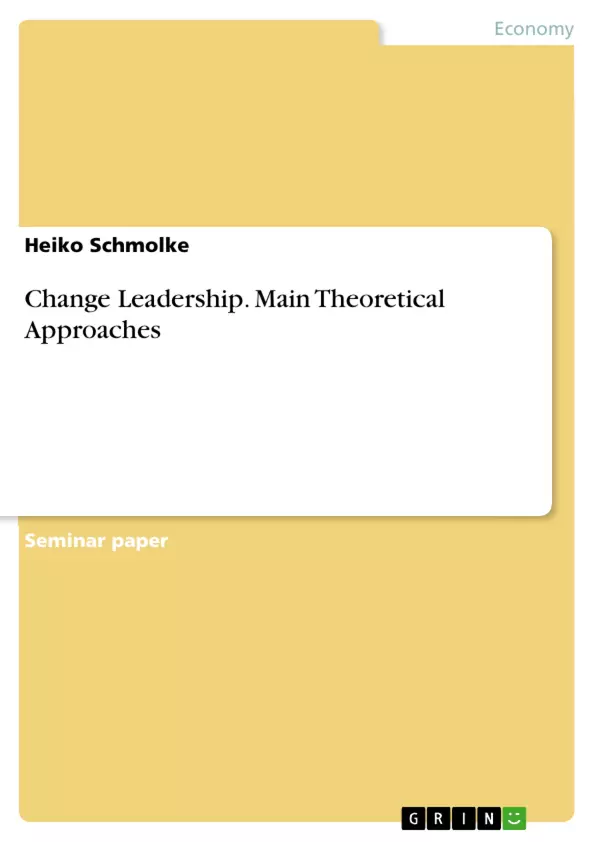The purpose of this research is to examine the subject of change leadership and its theoretical approaches. Scholars argue that the current economic and social environment is highly influenced by growing change. While a numerous recommendations have been made on specific strategies and activities managers should use to implement during change, the interpersonal dimension is often not considered sufficiently. Therefore the literature tends to distinguish leadership from management in the context of change.
By providing an understanding of the meaning and characterization of management leadership and change leadership, the dimensions of change leadership emphasize the charismatic and interpersonal aspects. It has been found that change leadership is more collaborative and seeks to inspire and even influence the beliefs and behaviors of people. Explicit models subsequently provide elements of effective leadership which again depends highly on the personality of the leader.
By using the assumptions of the dimensions and derived models, a series of phases regarding the implementation of change generate a strategic framework. These phases require a considerable length of time. It is advised to define aims or at least a condition where the organization hast to be in the future. In summary it can be said that the importance of leadership regarding change has to be considered sufficiently and is highly influenced by interpersonal aspects and soft skills.
Table of Contents
- Problem Statement
- The Definition of Change
- Challenges and general Conditions of Change
- The leadership of Change
- Change Management vs. Change Leadership
- Dimensions
- Models (elements of effective leadership)
- Strategic Approaches
- Conclusion
Objectives and Key Themes
The primary objective of this research is to examine the nature of change leadership and explore its theoretical foundations. It emphasizes that the current economic and social landscape is characterized by pervasive change, prompting a deeper understanding of leadership roles in navigating these transitions. While existing literature focuses on specific strategies and activities for change implementation, the paper highlights the often-overlooked importance of the interpersonal dimension in leadership. Key themes explored in this work include: * The distinction between change management and change leadership * The essential dimensions of change leadership, emphasizing charisma and interpersonal skills * The development of models outlining elements of effective change leadership * The significance of leadership personality and its impact on change implementation * Strategic approaches for effectively managing and leading changeChapter Summaries
This research paper begins by establishing the problem statement and providing a comprehensive definition of change. It then delves into the challenges and conditions that typically accompany organizational change. The subsequent section explores the critical aspects of change leadership, drawing a distinction between change management and change leadership, highlighting the interpersonal dimensions, and examining models of effective leadership. The paper also delves into strategic approaches for implementing change, focusing on phases and considerations for success.Keywords
This research centers on the concept of change leadership, examining its theoretical frameworks and practical applications. Key terms include change management, leadership, interpersonal skills, charismatic leadership, change models, and strategic implementation. The paper delves into the multifaceted nature of leadership in the context of organizational change, emphasizing the crucial role of effective communication, inspiration, and collaboration.Frequently Asked Questions
What is the difference between Change Management and Change Leadership?
Change Management focuses on the tools and structures to implement change, while Change Leadership emphasizes the charismatic, interpersonal aspects and the ability to inspire people.
Why are interpersonal skills important for change leaders?
Soft skills and interpersonal dimensions are crucial to influence the beliefs and behaviors of employees, ensuring they support the transition rather than resisting it.
What are the models of effective Change Leadership?
Models of effective leadership often depend on the personality of the leader and their ability to collaborate and communicate a clear vision of the future state.
How long does the implementation of change usually take?
Strategic change implementation requires a considerable length of time and often proceeds through several distinct phases to be successful.
What is the role of a leader's personality in change?
A leader's personality, particularly their charisma and collaborative nature, is a major factor in how effectively they can drive organizational change.
- Arbeit zitieren
- B.Sc. Heiko Schmolke (Autor:in), 2014, Change Leadership. Main Theoretical Approaches, München, GRIN Verlag, https://www.grin.com/document/294444



